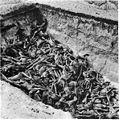The Genocide PortalGenocide is violence that targets individuals because of their membership of a group and aims at the destruction of a people. Raphael Lemkin, who first coined the term, defined genocide as "the destruction of a nation or of an ethnic group" by means such as "the disintegration of [its] political and social institutions, of [its] culture, language, national feelings, religion, and [its] economic existence". During the struggle to ratify the Genocide Convention, powerful countries restricted Lemkin's definition to exclude their own actions from being classified as genocide, ultimately limiting it to any of five "acts committed with intent to destroy, in whole or in part, a national, ethnical, racial or religious group". Genocide has occurred throughout human history, even during prehistoric times, but is particularly likely in situations of imperial expansion and power consolidation. Therefore, it is associated with colonial empires and settler colonies, as well as with both world wars and repressive governments in the twentieth century. The colloquial understanding of genocide is heavily influenced by the Holocaust as its archetype and is conceived as innocent victims targeted for their ethnic identity rather than for any political reason. Genocide is widely considered to be the epitome of human evil and often referred to as the "crime of crimes"; consequently, events are often denounced as genocide. (Full article...) Selected article The massacres of Poles in Volhynia and Eastern Galicia were part of an ethnic cleansing operation carried out in Nazi German-occupied Poland by the Ukrainian Insurgent Army (UPA) in the area of Volhynia, Polesia, Lublin region and Eastern Galicia beginning in 1943 and lasting up to 1945. The peak of the genocide took place in July and August 1943. Most of the victims were women and children. UPA's methods were particularly brutal, and resulted in 40,000–60,000 polish deaths in Volhynia and 30,000–40,000 in Eastern Galicia, with the other regions for the total about 100,000. The killings were directly linked with the policies of the Bandera faction of the Organization of Ukrainian Nationalists (OUN-B) and its military arm, the Ukrainian Insurgent Army, whose goal as specified at the Second Conference of the OUN-B on 17–23 February 1943 (or March 1943 according to other sources) was to purge all non-Ukrainians from the future Ukrainian state. Not limiting their activities to the purging of Polish civilians, UPA also wanted to erase all traces of the Polish presence in the area. The violence was endorsed by a significant number of the Ukrainian Orthodox clergy who supported UPA's nationalist cause. The massacres led to a civil conflict between Polish and Ukrainian forces in the German-occupied territories, with the Polish Home Army in Volhynia responding to the Ukrainian attacks. In 2008, the massacres committed by the Ukrainian nationalists against ethnic Poles in Volhynia and Galicia were described by Poland's Institute of National Remembrance as bearing the distinct characteristics of a genocide, and on 22 July 2016, the Parliament of Poland passed a resolution recognizing the massacres as genocide. Selected biographyMartin Shaw (born 30 June 1947 in Driffield, Yorkshire, England) is a British sociologist and academic. He is a research professor of international relations at the Institut Barcelona d'Estudis Internacionals, and emeritus professor of international relations and politics at Sussex University. He is best known for his sociological work on war, genocide and global politics. (Full article...) Quote
Related portalsSelected imagesDid you know...
Genocide listsInternational prosecution of genocide (ad hoc tribunals)It is commonly accepted that, at least since World War II, genocide has been illegal under customary international law as a peremptory norm, as well as under conventional international law. Acts of genocide are generally difficult to establish, for prosecution, since intent, demonstrating a chain of accountability, has to be established. International criminal courts and tribunals function primarily because the states involved are incapable or unwilling to prosecute crimes of this magnitude themselves. For more information see: International prosecution of genocide (International Criminal Court)To date all international prosecutions for genocide have been brought in specially convened international tribunals. Since 2002, the International Criminal Court can exercise its jurisdiction if national courts are unwilling or unable to investigate or prosecute genocide, thus being a "court of last resort," leaving the primary responsibility to exercise jurisdiction over alleged criminals to individual states. Due to the United States concerns over the ICC, the United States prefers to continue to use specially convened international tribunals for such investigations and potential prosecutions.[1] For more information see:
Genocide topicsGenocide Article Index
CategoriesThings you can do
Associated WikimediaThe following Wikimedia Foundation sister projects provide more on this subject:
Web resourcesExternal links
Discover Wikipedia using portals |































